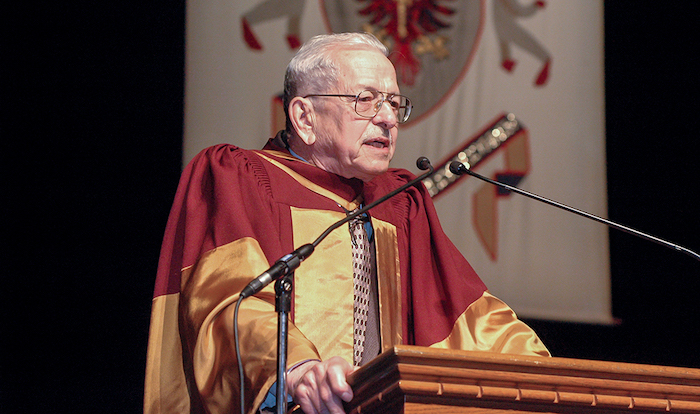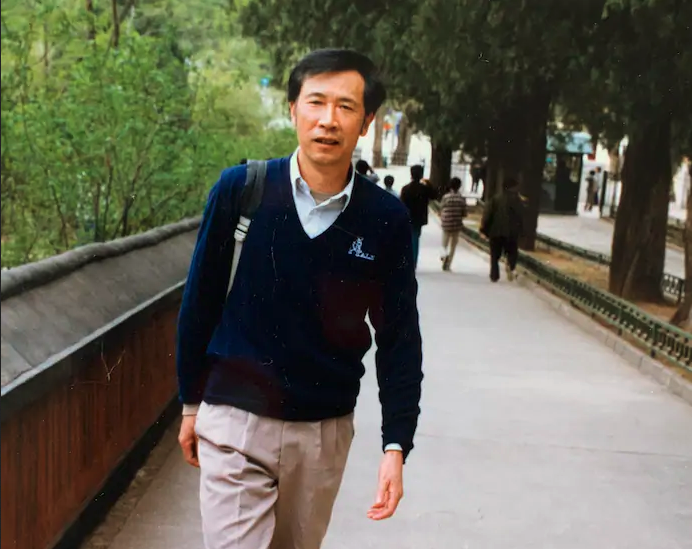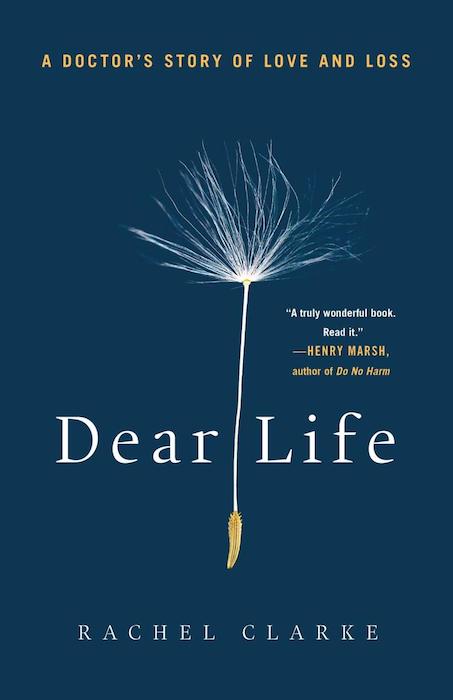I spent a lifetime counseling others before my diagnosis. Will I be able to take my own advice?

I have spent a good part of my life talking with people about the role of faith in the face of imminent death. Since I became an ordained Presbyterian minister in 1975, I have sat at countless bedsides, and occasionally even watched someone take their final breath. I recently wrote a small book, On Death, relating a lot of what I say to people in such times. But when, a little more than a month after that book was published, I was diagnosed with pancreatic cancer, I was still caught unprepared.
On the way home from a conference of Asian Christians in Kuala Lumpur in February 2020, I developed an intestinal infection. A scan at the hospital showed what looked like enlarged lymph nodes in my abdomen: No cause for concern, but come back in three months just to check. My book was published. And then, while all of us in New York City were trying to protect ourselves from COVID-19, I learned that I already had an agent of death growing inside me.
I spent a few harrowing minutes looking online at the dire survival statistics for pancreatic cancer, and caught a glimpse of On Death on a table nearby. I didn’t dare open it to read what I’d written.
My wife, Kathy, and I spent much time in tears and disbelief. We were both turning 70, but felt strong, clear-minded, and capable of nearly all the things we have done for the past 50 years. “I thought we’d feel a lot older when we got to this age,” Kathy said. We had plenty of plans and lots of comforts, especially our children and grandchildren. We expected some illness to come and take us when we felt really old. But not now, not yet. This couldn’t be; what was God doing to us? The Bible, and especially the Psalms, gave voice to our feelings: “Why, O Lord, do you stand far off?” “Wake up, O Lord. Why are you sleeping?” “How long, O Lord? Will you forget me forever?”
A significant number of believers in God find their faith shaken or destroyed when they learn that they will die at a time and in a way that seems unfair to them. Before my diagnosis, I had seen this in people of many faiths. One woman with cancer told me years ago, “I’m not a believer anymore—that doesn’t work for me. I can’t believe in a personal God who would do something like this to me.” Cancer killed her God.
What would happen to me? I felt like a surgeon who was suddenly on the operating table. Would I be able to take my own advice?
One of the first things I learned was that religious faith does not automatically provide solace in times of crisis. A belief in God and an afterlife does not become spontaneously comforting and existentially strengthening. Despite my rational, conscious acknowledgment that I would die someday, the shattering reality of a fatal diagnosis provoked a remarkably strong psychological denial of mortality. Instead of acting on Dylan Thomas’s advice to “rage, rage against the dying of the light,” I found myself thinking, What? No! I can’t die. That happens to others, but not to me. When I said these outrageous words out loud, I realized that this delusion had been the actual operating principle of my heart.
The cultural anthropologist Ernest Becker argued that the denial of death dominates our culture, but even if he was right that modern life has heightened this denial, it has always been with us. As the 16th-century Protestant theologian John Calvin wrote, “We undertake all things as if we were establishing immortality for ourselves on earth. If we see a dead body, we may philosophize briefly about the fleeting nature of life, but the moment we turn away from the sight the thought of our own perpetuity remains fixed in our minds.” Death is an abstraction to us, something technically true but unimaginable as a personal reality.
I’ve watched many others partake of this denial of death and then struggle when their convictions evaporate, and not just among the religious. I spent time as a pastor with sick and dying people whose religious faith was nominal or nonexistent. Many had a set of beliefs about the universe, even if they went largely unacknowledged—that the material world came into being on its own and that there is no supernatural world we go to after death. Death, in this view, is simply nonexistence, and therefore, as the writer Julian Barnes has argued, nothing to be frightened of. These ideas are items of faith that can’t be proved, and people use them as Barnes does, to stave off fear of death. But I’ve found that nonreligious people who think such secular beliefs will be comforting often find that they crumple when confronted by the real thing.
I use the terms head and heart to mean reasoning and feeling, adapting to the modern view that these two things are independent faculties. The Hebrew scriptures, however, see the heart as the seat of the mind, will, and emotions. Proverbs says, “As he thinketh in his heart, so is he.” In other words, rational conviction and experience might change my mind, but the shift would not be complete until it took root in my heart. And so I set out to reexamine my convictions and to strengthen my faith, so that it might prove more than a match for death.
Paul Brand, an orthopedic surgeon, spent the first part of his medical career in India and the last part of his career in the U.S. “In the United States … I encountered a society that seeks to avoid pain at all costs,” he wrote in his recent memoir. “Patients lived at a greater comfort level than any I had previously treated, but they seemed far less equipped to handle suffering and far more traumatized by it.”
Why is it that people in prosperous, modern societies seem to struggle so much with the existence of evil, suffering, and death? In his book A Secular Age, the philosopher Charles Taylor wrote that while humans have always struggled with the ways and justice of God, until quite recently no one had concluded that suffering made the existence of God implausible. For millennia, people held a strong belief in their own inadequacy or sinfulness, and did not hold the modern assumption that we all deserve a comfortable life. Moreover, Taylor has argued, we have become so confident in our powers of logic that if we cannot imagine any good reason that suffering exists, we assume there can’t be one.
But if there is a God great enough to merit your anger over the suffering you witness or endure, then there is a God great enough to have reasons for allowing it that you can’t detect. It is not logical to believe in an infinite God and still be convinced that you can tally the sums of good and evil as he does, or to grow angry that he doesn’t always see things your way. Taylor’s point is that people say their suffering makes faith in God impossible—but it is in fact their overconfidence in themselves and their abilities that sets them up for anger, fear, and confusion.
When I got my cancer diagnosis, I had to look not only at my professed beliefs, which align with historical Protestant orthodoxy, but also at my actual understanding of God. Had it been shaped by my culture? Had I been slipping unconsciously into the supposition that God lived for me rather than I for him, that life should go well for me, that I knew better than God does how things should go? The answer was yes—to some degree. I found that to embrace God’s greatness, to say “Thy will be done,” was painful at first and then, perhaps counterintuitively, profoundly liberating. To assume that God is as small and finite as we are may feel freeing—but it offers no remedy for anger.
Another area of head work for me had to do with Jesus’s resurrection. Ironically, I had already begun working on a book about Easter. Before cancer, the resurrection had been a mostly theoretical issue for me—but not now. I’m familiar with the common charge that any belief in an afterlife is mere wish fulfillment without grounding in fact—and that belief in Jesus is in the same category as faith in the Flying Spaghetti Monster. But over the past 20 years, I’ve been drawn to the work of the British biblical scholar N. T. Wright, who mounts a historical case for Jesus’s bodily resurrection.
I returned to his material now, with greater skepticism than I had previously applied. I didn’t want to be taken in. But as I reread his arguments, they seemed even more formidable and fair to me than they had in the past. They gave me a place to get my footing. Still, I needed more than mental assent to believe in the resurrection.
The heart work came in as I struggled to bridge the gap between an abstract belief and one that touches the imagination. As the early American philosopher Jonathan Edwards argued, it is one thing to believe with certainty that honey is sweet, perhaps through the universal testimony of trusted people, but it is another to actually taste the sweetness of honey. The sense of the honey’s sweetness on the tongue brings a fuller knowledge of honey than any rational deduction. In the same way, it is one thing to believe in a God who has attributes such as love, power, and wisdom; it is another to sense the reality of that God in your heart. The Bible is filled with sensory language. We are not only to believe that God is good but also to “taste” his goodness, the psalmist tells us; not just to believe that God is glorious and powerful but also to “see” it with “the eyes of the heart,” it says in Ephesians.
On December 6, 1273, Thomas Aquinas stopped writing his monumental Summa Theologiae. When asked why by his friend Reginald, he replied that he had had a beatific experience of God that made all his theology “seem like straw” by comparison. That was no repudiation of his theology, but Thomas had seen the difference between the map of God and God himself, and a very great difference it was. While I cannot claim that any of my experiences of God in the past several months have been “beatific,” they have been deeper and sweeter than I have known before.
My path to this has involved three disciplines.
The first was to immerse myself in the Psalms to be sure that I wasn’t encountering a God I had made up myself. Any God I make up will be less troubling and offensive, to be sure, but then how can such a God contradict me when my heart says that there’s no hope, or that I’m worthless? The Psalms show me a God maddening in his complexity, but this difficult deity comes across as a real being, not one any human would have conjured. Through the Psalms, I grew in confidence that I was before “him with whom we have to do.”
I had to look hard at my deepest trusts, my strongest loves and fears, and bring them into contact with God. Sometimes—not always, or even usually—this leads, as the poet George Herbert wrote, to “a kind of tune … softness, and peace, and joy, and love, and bliss, exalted manna … heaven in the ordinary.” But even though most days’ hour of Bible reading, meditation, soliloquy, and prayer doesn’t yield this kind of music, the reality of God and his promises grew on me. My imagination became more able to visualize the resurrection and rest my heart in it.
Most particularly for me as a Christian, Jesus’s costly love, death, and resurrection had become not just something I believed and filed away, but a hope that sustained me all day. I pray this prayer daily. Occasionally it electrifies, but ultimately it always calms:
And as I lay down in sleep and rose this morning only by your grace, keep me in the joyful, lively remembrance that whatever happens, I will someday know my final rising, because Jesus Christ lay down in death for me, and rose for my justification.
Kathy finds deep consolation and rest in the familiar, comforting places where we vacation. Some of them are shacks with bare light bulbs on wires, but they are her Sehnsucht locations—the spaces for which she longs. My pseudo-salvations are professional goals and accomplishments—another book, a new ministry project, another milestone at the church. For these reasons we found that when we got to the end of a vacation at the beach, our responses were both opposite and yet strangely the same.
Kathy would begin to mourn the need to depart almost as soon as she arrived, which made it impossible for her to fully enjoy herself. She would fantasize about handcuffing herself to the porch railing and refusing to budge. I, however, would always chafe and be eager to get back to work. I spent much of the time at the beach brainstorming and writing out plans. Neither of us learned to savor the moment, and so we never came home refreshed.
To our surprise and encouragement, Kathy and I have discovered that the less we attempt to make this world into a heaven, the more we are able to enjoy it.
No longer are we burdening it with demands impossible for it to fulfill. We have found that the simplest things—from sun on the water and flowers in the vase to our own embraces, sex, and conversation—bring more joy than ever. This has taken us by surprise.
This change was not an overnight revolution. As God’s reality dawns more on my heart, slowly and painfully and through many tears, the simplest pleasures of this world have become sources of daily happiness. It is only as I have become, for lack of a better term, more heavenly minded that I can see the material world for the astonishingly good divine gift that it is.
I can sincerely say, without any sentimentality or exaggeration, that I’ve never been happier in my life, that I’ve never had more days filled with comfort. But it is equally true that I’ve never had so many days of grief. One of our dearest friends lost her husband to cancer six years ago. Even now, she says, she might seem fine, and then out of nowhere some reminder or thought will sideswipe her and cripple her with sorrow.
Yes. But I have come to be grateful for those sideswipes, because they remind me to reorient myself to the convictions of my head and the processes of my heart. When I take time to remember how to deal with my fears and savor my joys, the consolations are stronger and sweeter than ever.
Complete Article ↪HERE↩!






